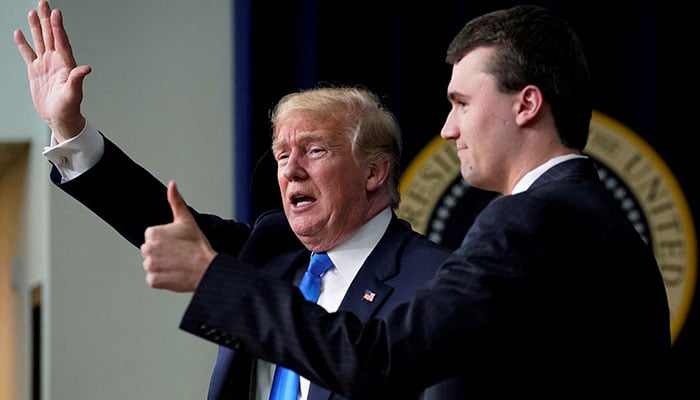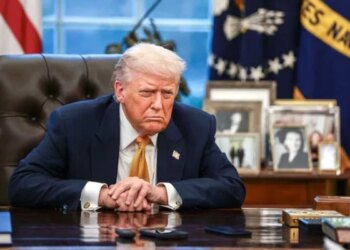Select Language:
Since Charlie Kirk was shot on a Utah college campus while delivering a speech, President Donald Trump has taken on an unusually active role in communicating about the incident. Trump was the first to confirm Kirk’s death and announced that the suspect was in custody, mentioning the timing of Kirk’s funeral and indicating his intention to attend.
Initially, Trump blamed, without providing evidence, the “radical left” for the shooting, a claim echoed by many of his supporters, who called for retribution amid rising right-wing anger. Kirk, a well-known and often controversial podcast host and author, left behind a wife, close friends, and a large following after being shot.
In the aftermath, Trump has shifted into a prominent messenger, sharing information typically issued by law enforcement or local officials. This approach contrasts with the more cautious style of previous presidents but aligns with Trump’s preference for direct, unfiltered communication and his tendency to involve himself directly in domestic and international issues.
Mercedes Schlapp, a senior adviser to Trump during his first term, noted, “Donald Trump is very detail-oriented. Whether he’s building the Rose Garden or handling a tragedy, he wants to be the one to deliver the news.”
Trump ordered flags lowered to half-staff, proposed awarding Kirk the Presidential Medal of Freedom, and saw Vice President Pence escort Kirk’s casket back to his home state via Air Force Two—actions that are quite extraordinary for honoring someone who has never held elected office or military rank.
Trump’s connection with Kirk is both personal and political. He credits Kirk’s leadership with helping him connect with young voters. “Charlie had a special influence over young people,” Trump said on Fox News, recalling how his teenage son Barron was captivated by the young activist.
However, Kirk was a fiercely partisan figure, known for his confrontational style and anti-immigrant rhetoric, which often led to clashes online and in public. His far-right opinions on topics like abortion, civil rights, and gun control sparked strong reactions from targeted groups.
While Trump has called for calm and non-violence, he has avoided directly addressing how the country can heal during this period of heightened political violence, which is some of the worst in decades. Last year, Trump himself survived two assassination attempts.
Though Trump downplayed extremism on the right, telling reporters that “we just have to beat the hell out of them,” he continues to fuel his supporters’ calls for revenge against the “radical left.”
Suspect Tyler Robinson, 22, from Utah, was arrested Thursday night. Authorities are examining messages engraved on four bullet casings, which might point to either left- or right-wing motives.
According to Schlapp, Trump has grown more comfortable with spontaneous exchanges with the media during his second term. “He wants to drive the news, and he’s good at it,” she said. His aggressive communication style allows him to shape narratives unilaterally, often bypassing standard protocols.
Since the shooting, there have been no official briefings from aides, as they tend to let Trump speak on policy matters and major events. His off-the-cuff style carries risks, as early statements may influence investigations or later conflict with the facts.
Political analyst Yu Ouyang noted, “Presidents usually don’t break news like this in real time because of the impact their words can have.” Critics, including Senator Elizabeth Warren, criticized Trump for his remarks last week, pointing out that political violence affects all sides, not just conservatives. Some observers noted his relatively muted response to the earlier killing of Minnesota Democrat Melissa Hortman compared to his comments on Kirk.
In a televised Oval Office address, Trump said, “Violence and murder are the tragic results of demonizing those you disagree with,” but mainly targeted left-wing rhetoric. Denise Bostdorff, a professor of communication studies, commented, “Even when trying to offer condolences, Trump’s rhetoric has often amplified division by blaming specific groups before understanding the full story.”
The White House declined to comment. Supporters appreciate Trump’s direct, unorthodox style, which defies norms and keeps him central to the national conversation. Barry Bennett, a former campaign adviser, summed it up: “Ronald Reagan was an orator, but Trump understands how to control the speed of news and get a story out quickly.”







